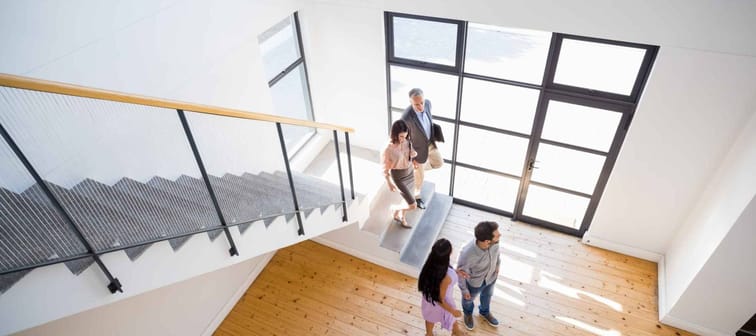What are different ways to invest in real estate?
Some methods of investing in real estate are “active” (owning your principal residence, owning a rental property, house flipping, etc.), while others are “passive” (REITs, ETFs, and mutual funds). Perhaps you’re already familiar with a few of the below approaches to real estate investing, while others might be entirely new to you.
Buy a principal/primary residence
The classic approach to investing in real estate is purchasing a principal/primary residence. When you buy your primary residence, not only are you buying a place to live in; you’re buying a long-term investment. Instead of paying your landlord’s mortgage when renting, you’re paying your own mortgage, helping grow your net worth.
Indicators you want to be looking for when buying a principal residence include: a home in a good neighbourhood, with low crime rates and easy access to public transit and highways; a school district with a good reputation and rating; and close proximity to convenient amenities, like restaurants, shopping, and parks. If you’re not sure where to begin, we have some suggestions for the best places to invest in real estate in Canada.
It’s unlikely that you have the savings needed to purchase a home outright. Instead, you’ll probably need to gradually save up for a down payment and then use that down payment to take out a mortgage.
First-time homebuyers can withdraw up to $35,000 from an RRSP to be used for their down payment. For those who aren’t first-time homebuyers, the TFSA is the next best place to save for a down payment. If you already have a TFSA, it’s worthwhile to check if any other financial institutions offer TFSAs with higher interest rates compared to the rate you’re getting now. Digital banks, like EQ Bank, usually offer substantially higher interest rates than the Big 5.
House flipping
Made popular by shows on HGTV, house flipping can make a killing when done correctly. With a house flip, you buy a “fixer-upper” with a lot of potential, renovate it quickly, then turn around and sell it for a handsome profit. But keep in mind that although it may look easy on TV, house flipping isn’t always a slam dunk. You can run into all sorts of issues and cost overruns (knob and tube wiring hidden inside the walls, mold, asbestos nightmares, etc.), so be sure to know what you’re getting into before deciding to go with this strategy.
To improve your chances of a successful house flip, you’ll want to look for a property that requires some TLC cosmetically (painting, upgrading fixtures, flooring, etc.), but doesn’t have any major faults, such as structural issues or a leaky basement.
Speak with a realtor ahead of time to make sure you’ll be able to resell the property for the amount you’re looking for. You’ll then want to compare the property’s estimated cost of renovations relative to its estimated final sale price, crunching the numbers to ensure you can realistically turn a profit.
Invest in rental properties
If you’re someone who’s risk-averse and house flipping is a little too nerve-racking for you, you might consider buying a rental property instead. Similar to your principal residence, you’ll want to purchase a rental property in a decent neighbourhood that’s attractive to tenants. Quality tenants will be drawn to your property if a major employer, like a hospital, is nearby.
While a rental property is certainly an active investment, you can choose to be as involved as you like. You can manage it yourself as the landlord or hire a property manager to deal with the tenants and look after the property for you.
Keep in mind that getting a mortgage for a rental property isn’t the same as getting one for a house you intend to live in. Rates tend to be higher on rental properties than they are for principal residences, and the expense of a property manager combined with a higher mortgage rate can really eat into your property’s rental income. If you’d like to invest in a rental property it’s especially critical to compare a number of lenders and mortgage rates that might be available to you, rather than just approaching your usual bank and taking their first offer.
Online mortgage brokers like Breezeful can compare your borrower profile to dozens of different mortgage offers, increasing the likelihood that you’ll get the lowest rate possible and cutting down the amount of time you would otherwise spend contacting multiple lenders personally.
Buy a vacation property
When buying a vacation property, it’s important to consider exactly why you’re buying it. Is it mainly meant to be for pleasure—somewhere to relax away from the grind? Or is it primarily an investment? If the latter, buying in an in-demand location (like on a lake with beach access, an hour or two’s commute from the big city) could generate a decent amount of money from renting it out.
Not ready to be a full-time vacation property owner? You could buy into a timeshare instead. With a timeshare, you share the cost and usage of the property with other owners (although the tradeoff is that you won’t be able to earn rental income like when you own a cottage). If you’re looking to buy a timeshare, consider purchasing one from the resale market to get the best value.
Pre-sale condo assignments
Looking for a passive way to invest in real estate? Then you might want to check out pre-sale condo assignments. A pre-sale condo assignment is when you, the investor/buyer, sell your rights to a completed condo to another buyer before the condo is complete. It’s called an “assignment” because you sign your rights to the new buyer. Condo assignments tend to be popular in hot real estate markets like Toronto and Vancouver where home prices appreciate faster than the rest of Canada. Please note that condo developers sometimes charge a 1% assignment fee for anyone looking to do this.
In terms of indicators, you’ll want to buy a condo in an area where condo prices are expected to continue to rise in the years to come. Your best source for that is by doing your own research about other future developments planned in the area and by speaking to a knowledgeable, local realtor.
More: Best places to live in Canada
REITs
An REIT (real estate investment trust) is a company that owns and operates a wide range of commercial properties, including offices, apartments, hospitals, and shopping centres. You can purchase shares of publicly-traded REITs just like you would shares of any other publicly-traded company. Although past performance isn’t a guarantee of future performance, you’ll probably want to invest in something with a stable stock price history and a consistent history of paying dividends.
If you’re concerned about opening yourself up to risk by buying too many shares of a single REIT, you can instead elect to buy an ETF that invests in a diversity of REIT securities. You can speak with your financial advisor about buying shares of REITs or investing in REIT ETFs, or you can access these investments yourself by signing up with a low-cost online broker, like Questrade.
If you’re new to trading securities and are daunted by the idea of choosing REIT shares or REIT ETFs independently, you can still invest in them by putting money into an automated investing service called a robo-advisor. Some robo-advisors, like Questwealth Portfolios, have pre-built ETF portfolios that specifically include REIT ETFs.
Start investing with Questrade and get $50 in free trades
Private mortgages
Are you sick and tired of the banks making all the money from mortgages? Then why not get a piece of the pie yourself? With private mortgages, you essentially become the bank. You loan your money to a homeowner just like the bank would. A borrower might seek out a private mortgage because they don’t qualify at one of the big banks, perhaps due to a bruised credit score or a low income. The easiest way to find prospective borrowers and loan out your funds is with the services of a mortgage broker.
Unlike a mortgage from one of the big banks, you can expect to earn a higher interest rate, potentially making it an attractive investment. Just remember that with a higher interest rate comes higher risk, as these borrowers may have been turned down by the big banks for good reason. You’ll want to do your own due diligence to make sure you’re investing in a trustworthy borrower and a rock-solid property. Someone who’s trustworthy may have a lower credit score due to an unpreventable event in life, such as an illness or injury, but has a consistent track record of paying their debts on time and in full outside that anomalous circumstance.
Another way you can become a mortgagee is via a vendor take-back mortgage. A vendor take-back mortgage is where you, the seller, own the property and lend the money to the buyer to purchase it. Though relatively uncommon these days, vendor take-back mortgages are certainly an option if the buyer is running into difficulties closing a home sale. A vendor take-back mortgage can benefit the seller as well since it allows them to close on the property. The seller may have already purchased another property, and they need the equity from the home that they’re selling to close on that.
Before going ahead with a vendor take-back mortgage, it’s important to be aware of the risks that come with it. Mainly, you could be liable if the buyer is ultimately unable to pay for the mortgage for whatever reason.
Rent out a spare room
You don’t have to own a non-owner-occupied rental property to become a landlord. Thanks to short-term rental websites like Airbnb, you can rent out a spare bedroom in your residence and make some extra cash. Just be sure to check with your municipal bylaws and condo board rules (if applicable) before renting out your place, as more and more cities are imposing tougher restrictions.
Also, you’ll need to inform your insurer that you have a lodger. Short-term tenants may not treat the property with the same level of care as you would, so your home insurance premium will likely increase to reflect the additional risk incurred by the insurer.
Rent-to-own
The high cost of homeownership in some real estate markets has others considering different ways to work toward owning real estate. If you’d like to own a home, but you can’t seem to save enough for the down payment, a rent-to-own mortgage is worth considering. With rent-to-own, the seller gives the tenant the right to buy the property at a future point in time, with a portion of the tenant’s monthly rent gradually building up a down payment for the purchase. Tenants are also typically required to make a deposit toward the final sale price (usually at least 5% of the purchase price made at the time of purchase).
Although you can approach your landlord and suggest rent-to-own, it’s easier to look for a landlord and building that specifically offers the rent-to-own arrangement.
Commercial properties
Commercial properties include everything from shopping malls to office buildings and in between. You can technically invest directly in commercial properties, but most of us don’t have a spare $1 or $2 million to go toward the hefty down payment (at least, not yet). The more realistic way to invest is through a commercial real estate company’s mutual fund or ETF.
How much money do I need to have saved up in order to invest in real estate?
With passive real estate investments such as REITs, real estate ETFs, and mutual funds, you could invest for as little as the share price.
If you want to actively invest in real estate by owning a property, and you plan to live there (it’s ‘owner occupied’), you’ll be required to make a down payment of at least 5% on a home with a purchase price under $500K. Note that the down payment will be required to be a larger percentage of the purchase price if the home price is over the $500K and $1 million thresholds. If you’re planning to buy an investment/rental property (a non-owner occupied property), you’ll typically be required to make a down payment of at least 20%.
Whatever route you take, the good news is that there’s a way for almost everyone to invest in real estate regardless of their income or savings level.





